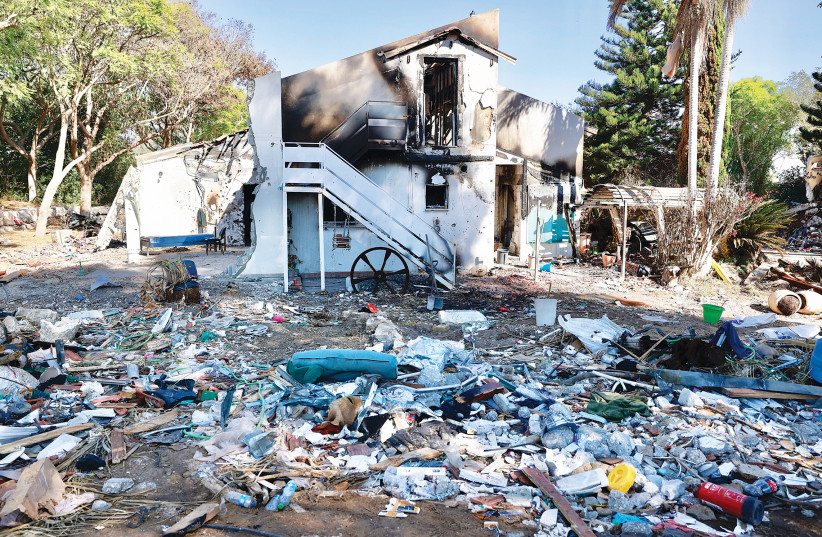In 1998, I co-edited a book honoring Israel’s 50th Anniversary, entitled Israel Among the Nations. Professor Alan Dershowitz aptly named his contribution: “Israel – The Jew among the Nations.” Dershowitz pointed out that “no civilized nation in the history of the world which has faced comparable threats to its survival – both external and internal – has ever made greater efforts at, and has ever come closer to, achieving the highest norms of the rule of law.
“Yet no civilized nation in the history of the world – including totalitarian and authoritarian regimes – has ever been as repeatedly, unfairly, and hypocritically condemned and criticized by the international community as Israel has been over the years,” he wrote.
The interim orders made by the International Court of Justice regarding the claim brought against Israel by South Africa, a rogue state that pays no respect to basic human rights, offer another exemplary case in point.
The ICJ may only exercise jurisdiction over claims brought by states if the defendant state agrees to submit to its jurisdiction. Israel was one of the first states to ratify the Convention on the Prevention and Punishment of the Crime of Genocide, which provides for compulsory jurisdiction in case of genocide.

On October 7, the Hamas terror organization, which has controlled Gaza since 2007, launched an attack on Israeli sovereign territory with a force of thousands, and slaughtered in the most gruesome, horrifying manner about 1,200 men, women and children, mostly civilians.
The terrorists abused the victims, beheaded adults and babies, burnt people and babies alive, raped women brutally and committed atrocities, the likes of which have not been seen since the genocide of European Jews during the Holocaust.
Over 4,000 people were wounded, among them many who suffered grave and mortal injuries. In addition, about 250 people (among them women, children, and babies) were abducted to Gaza.
Thousands of rockets and missiles have since been launched at Israeli towns, targeting only civilians. The Hamas leaders have declared that, given the chance, they will repeat these acts again and again.
The convention makes it the duty of every contracting state to combat genocide. Yet when Israel was compelled to protect its citizens from genocide, it found itself accused of the very crime it had the duty to prevent.
Israel at the ICJ
Israel provided the ICJ with evidence proving that it has done its best, way beyond the requirements set by international law, to keep civilians out of harm’s way.
A state that, while fighting for its own survival, calls for the evacuation of enemy civilians, provides evacuation routes and half a million tons of humanitarian assistance – including 400,000 tons of food, in addition to water and energy – and protects the construction of a pier in central Gaza by the US to enable more humanitarian aid to be delivered to the citizens directly, cannot be charged with committing genocide.
The ratio of civilian to military casualties in Gaza is among the lowest in the history of warfare. Over the years, the Israel Supreme Court made orders constraining Israel in its war on terror in ways that go far beyond the rules of international warfare.

Israelis were led to believe that if they placed such heavy, unheard of constraints on themselves, they would be protected from prosecution in international courts – but to no avail, as it has become amply clear now.
By contrast, Hamas has used the civilian population as human shields, obstructed their safe escape, and used hospitals, schools, and mosques for military purposes. The terrorist organization has also not built any shelters to protect civilians.
This past week, the Pentagon admitted that none of the over 500 metric tons of aid from the US, provided through the US-built pier, has made it to the people, having first been looted by Hamas.
A week ago, the terrorist organization targeted the Israeli soldiers who protected the passage of the humanitarian aid, killing three of them. Civilian Palestinians who cooperated with Israel in distributing the aid were likewise targeted by Hamas.
And yet it is Israel whom the ICJ is seeking to prevent from defending itself in its fight for survival, from rescuing the hostages kept in Gaza – without any humanitarian aid, and with no access to the Red Cross or any other humanitarian organization – and forcing it to capitulate to terror.
It is a shame that only the Honorable Judge Julia Sebutinde – the court’s re-elected vice president from Uganda – held that, in the absence of any evidence of genocide, the ICJ had no jurisdiction to adjudicate and, therefore, no jurisdiction to make interim orders. The court is not competent to micromanage Israel’s fight for survival.
The free world must support Israel’s fight for survival – or else it will find itself soon enough in a similar situation.
The author is a Professor of Law and a Titular Member, International Academy of Comparative Law
https://taliaeinhorn.com
